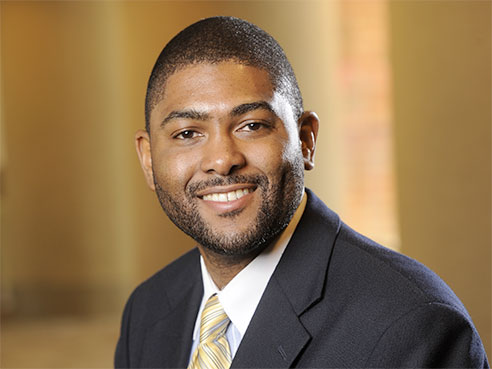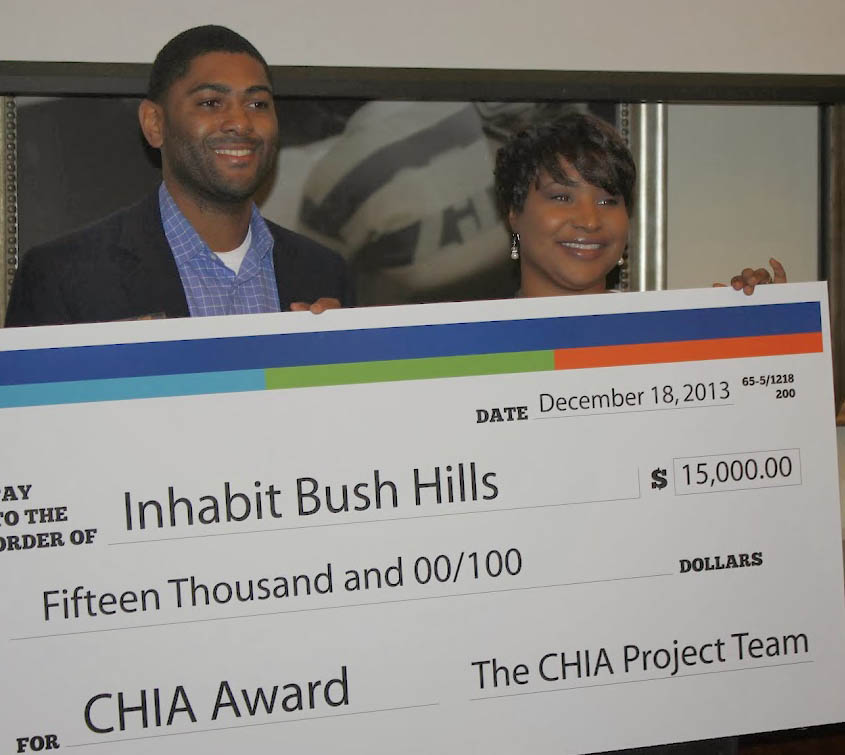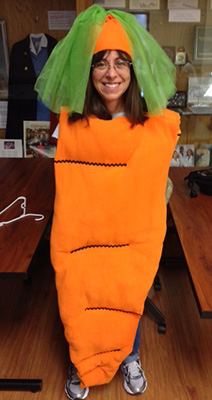Upcoming CCTS Events
 October 7, 2015
October 7, 2015 by Katherine Shonesy
A University of Alabama at Birmingham professor is being honored at the 2015 Vulcans Community Awards for his work to promote civic pride, leadership and progress within Birmingham’s metro area.
Anthony Hood, Ph.D., a management professor in the Collat School of Business, is the recipient of the Game Changer Spear award, for which he will be recognized at a dinner held Thursday, Oct. 8, at The Club.
Hood will be honored alongside UAB head football coach Bill Clark, the recipient of the Game Changer Vulcan award.
Hood, a Birmingham native who graduated from Ramsay High School, was awarded a Community Health Innovation Award with his wife from UAB’s Center for Clinical and Translational Sciences in 2013. The Hoods used the award to fund their project NHabit Bush Hills, an effort to create a community-based information system of empty and abandoned properties and their conditions in Birmingham’s Bush Hills neighborhood.
The Vulcans Community Awards symbolize pride in our region and the significant impact community members have had on the quality of life here. Recipients were chosen by an independent panel of diverse citizens.
April 9, 2015
by Javacia Harris Bowser - Photos by Steve Wood

Anthony Hood, Ph.D. and his wife Robin, often walk or drive through their Bush Hills neighborhood to admire the beautiful homes lining the streets. But they are also disheartened by how many homes appear unoccupied and abandoned.
So Hood and his wife are doing something about it. They developed NHabit Bush Hills, a grassroots initiative to gather and disseminate information to ensure that neighborhood properties are occupied and properly maintained. “We want to be the central information hub for Bush Hills,” Hood says. “A lot of information about the neighborhood is out there, but nobody has put it together to tell a complete story. “
Hood and his wife were able to launch NHabit Bush Hills thanks to the Community Health Innovation Awards (CHIA), an annual grant competition from the UAB Center for Clinical and Translational Sciences (CCTS). Administered by the CCTS One Great Community council, the awards encourage local organizations to develop clever, creative solutions to public-health challenges in Birmingham-area neighborhoods.
With a $15,000 CHIA grant, Hood and his wife developed a database of abandoned Bush Hills homes. Then they notified property owners, hoping to learn how the city and local organizations could help resolve any issues with the vacant houses. “CHIA has raised the profile of what we’re doing,” says Hood, an assistant professor in UAB’s Collat School of Business. “People know about us, and we’ve built a lot of relationships.” David VanWilliams (second from right) teaches job skills to Inglenook’s young adults, including (left to right) Ronny Thompson, Johnathan Woods, and Floyd O'Neal.Taking a Chance:
David VanWilliams (second from right) teaches job skills to Inglenook’s young adults, including (left to right) Ronny Thompson, Johnathan Woods, and Floyd O'Neal.Taking a Chance:
The seven newest CHIA winners were chosen last fall by a panel of five judges representing business, health care, public health, education, and nonprofit and private sectors. Some of their smart solutions include using art, gardens, light, and sound to create a safer Ensley; transforming a soup kitchen into a healthy food café to train junior chef interns; and promoting walking for transportation and fitness via smartphone apps and social media. Several UAB schools and centers contributed a total of $76,500 for grants.
Started in 2012, CHIA is no ordinary grant-making process, says Shauntice Allen, Ph.D., CCTS program manager for One Great Community. Applicants are matched with mentors and attend workshops to help them brainstorm unique ways to tackle community issues. Applicants also have the opportunity to make their case not only on paper, but through an oral presentation as well.
But what truly separates CHIA from other grant programs is its willingness to take chances, Allen says. “From a funding perspective, some of these organizations may be viewed as high risk, meaning they’ve never done this before,” Allen explains. “They may not even be well organized as an entity, but the idea is interesting, it’s something that is innovative, and it could really make a difference.”
Constructing a Brighter Future:
For years David VanWilliams, a master carpenter in Birmingham, had dreams of starting a program that would teach carpentry to young adults in Birmingham. With a $25,000 grant from CHIA, he was able to launch the Community Carpentry Project in the Inglenook neighborhood in March 2014. The inaugural class of 12 students, ages 18 to 25, completed the program with enough knowledge and training to be qualified for a job as a carpenter’s helper or to pursue advanced carpentry education.
“We have a lot of young people who, because they can’t get jobs, get frustrated and get involved in crime and violence, and this doesn’t have to be,”VanWilliams says. With his program’s training, young adults can now take advantage of “jobs that are happening all around them, whether it’s a restaurant, bridge, or high-rise building being built or a house being remodeled in the neighborhood,” he adds.
The carpentry project recently welcomed 12 new students, and VanWilliams also hopes to develop an after-school program for high school students and a Saturday program for students ages 10 to 13. “We would not have been able to implement this,” VanWilliams says, “had it not been for CHIA supporting our project.”
This article can also be found in UAB Magazine.
February 17, 2015
UAB School of Nursing
The University of Alabama at Birmingham (UAB) School of Nursing has been awarded a $10,000 grant from Community Health Innovation Awards (CHIA) to support The Foundry Clinic's initiative to provide healthy options and nutritional information to children in Lipscomb, Ala., a suburb of the Birmingham-Hoover Metropolitan Area.
 D'Ann Somerall, DNP, FNP-BC, Assistant Professor in the UAB School of Nursing, in conjunction with Nicole Redmond, MD, UAB Assistant Professor at in the Division of Preventive Medicine and Micha Andrews, Assistant Executive Director of The Foundry Ministries, submitted the grant to CHIA in September 2014. The organization awarded funds to select projects that seek to improve health of low-income families in the Birmingham area in a creative and resourceful way.
D'Ann Somerall, DNP, FNP-BC, Assistant Professor in the UAB School of Nursing, in conjunction with Nicole Redmond, MD, UAB Assistant Professor at in the Division of Preventive Medicine and Micha Andrews, Assistant Executive Director of The Foundry Ministries, submitted the grant to CHIA in September 2014. The organization awarded funds to select projects that seek to improve health of low-income families in the Birmingham area in a creative and resourceful way.
Somerall said an anonymous donor provided The Foundry with a food truck earlier this year. The Foundry Ministries named it the "Oasis Pantry Food Truck" and intended to use it as a vehicle to distribute fruits and vegetables to children around the Bessemer/Lipscomb area. The CHIA grant enables the organization to hire a part-time driver and purchase food from community food banks for a full year.
Once a week, she said, the driver will distribute fruits and vegetables to children in the Lipscomb area, focusing on school children schools. The food truck will play a jingle and Community Health Nursing students from UAB School of Nursing will dress as vegetables and will perform a skit designed to educate the children about nutrition in a creative and fun way.
"We will also discuss nutritional tips with parents, but the primary focus is on the engaging the kids. We want them to learn about healthy eating and why healthy eating is so important now and as they grow older," Somerall added.
Additionally, once a month The Foundry will hold educational sessions at Christ Community Church in Lipscomb where faculty and students will present recipes that correlate with the vegetables of the day. Those who attend will receive the vegetable to take home as well.
 "With our current funding, we will be able to continue this project for a year," said Somerall. "Our long-term goal is to create some type of sustainable product that will enable us to continue our project for years to come."
"With our current funding, we will be able to continue this project for a year," said Somerall. "Our long-term goal is to create some type of sustainable product that will enable us to continue our project for years to come."
The Foundry, a faith-based drug and alcohol rehabilitation program, also owns a farm in Cullman, Ala. Future plans call for the food truck to replenish its stock with produce grown in raised-bed gardens at the farm, Somerall said. There also are plans to sell food products from the farm around the Birmingham area to establish a source of sustainable income for the truck once the grant ends. Farming is proposed to begin in Spring 2015 and 40 residents from The Foundry's Farm in Cullman are expected to work there.
"I can't imagine a better way for The Foundry's residents to feel connected to the cause than to till the soil, plant the plants, see them grow, and then put the product to good use," said Somerall.
Micah Andrews says he is excited about the potential of this project.
"There is so much opportunity to help a part of town that often doesn't get much attention," said Andrews. "Eventually we are going to change a food desert to an oasis of healthy living."
The Foundry and the UAB School of Nursing have been partners for better health since April 2013. The UAB School of Nursing as operates the UAB School of Nursing Foundry Clinic, made possible through collaborative efforts of The Foundry Rescue Mission and Recovery Center, UAB School of Nursing Associate Dean for Clinical and Global Partnerships Cynthia Selleck, D.S.N., R.N., and Linda Roussel, D.S.N., R.N., faculty in the School of Nursing. The clinic is staffed Monday through Thursday from 8:30 a.m. to 5:30 p.m., and Friday from 8 a.m. – 1 p.m., by UAB School of Nursing nurse practitioner Melanie Baucom, CRNP, providing primary and urgent care for patients ages 14 and older.
Read more: CHIA Grantees Walk Birmingham Discuss Unique Collaboration

Eric Jack, Dean of the UAB Collat School of Business, congratulates Dr. Anthony Hood and Robin Anthony Hood, PhD, Assistant Professor in the UAB Collat School of Business, Department of Management, Information Systems and Quantitative Methods was one of this year's Community Health Innovation Award winners.
Read more: CHIA Grantee Dr. Anthony Hood on Award-Winning Project
